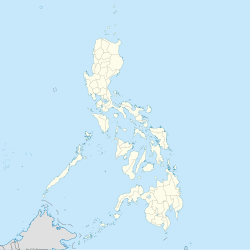Saint Joseph Cathedral (Nueva Ecija)
| Saint Joseph Cathedral | |
|---|---|
| Saint Joseph the Worker Cathedral | |
 Cathedral facade in 2013 | |
Location in Nueva Ecija Location in Luzon | |
| 15°47′32″N 120°59′22″E / 15.792167°N 120.989528°E | |
| Location | San Jose, Nueva Ecija |
| Country | Philippines |
| Denomination | Roman Catholic |
| History | |
| Status | Cathedral |
| Founded | 1910 |
| Dedication | Saint Joseph the Worker |
| Consecrated | 1984, 2006 |
| Architecture | |
| Functional status | Active |
| Architectural type | Church building |
| Style | Baroque Revival |
| Administration | |
| Archdiocese | Lingayen–Dagupan |
| Diocese | San Jose, Nueva Ecija |
| Clergy | |
| Bishop(s) | Roberto Calara Mallari |
| Priest(s) | Rev. Fr. Getty A. Ferrer, J.C.D. |
| Assistant priest(s) | Rev. Fr. Vic Kevin O. Ferrer
Rev. Fr. Cayetano Nidoy, Jr. Rev. Fr. Anthony Paul Bicomong |
Saint Joseph the Worker Cathedral, commonly known as Saint Joseph Cathedral, is a Roman Catholic cathedral located at Barangay Rafael Rueda, Sr. Poblacion in the city of San Jose, Nueva Ecija, Philippines. It is the seat of the Diocese of San Jose, Nueva Ecija and is dedicated to Saint Joseph the Worker.[1]
History
[edit]The first missionaries in what is now the province of Nueva Ecija were the Augustinians who also founded the parishes of Carranglan, Pantabangan and Puncan, of which San Jose was initially part of. San Jose was originally known as Kabaritan which is an Ilocano term for a "place abundant of barit", a type of rattan plant. It was a barrio of Puncan and then of Lupao, before becoming an independent town in 1894, and was renamed San Jose in honor of its patron saint, Joseph.[2]
Until 1928, San Jose was under the jurisdiction of the Diocese of Nueva Segovia before becoming part of the Diocese of Lingayen, later Lingayen–Dagupan, which was established in the same year. Under Lingayen–Dagupan, the church was administered by the Missionaries of the Sacred Heart after World War II. San Jose was then annexed to the Diocese of Cabanatuan when the diocese, then comprising the entire province of Nueva Ecija, was founded in 1963.[3] Twenty-one years later, in 1984, the church became the cathedral of the Diocese of San Jose whose territory comprises the northern half of the province.[1][3][4][5]
In 1997, the remodeling of the old cathedral church was started under then San Jose Bishop Leo Drona. It was finished in 2006 and was reconsecrated by then Lingayen–Dagupan Archbishop Oscar Cruz on March 20 of the same year.[6] The reredos or retablo of the cathedral are works of Kapampangan artist Willy Layug, who also worked on the cathedrals of Dagupan, Bacolod, and Urdaneta.[7][8]
Gallery
[edit]-
The view of the nave towards the sanctuary, taken in 2013
-
Bishop's cathedra
-
Side entrances of the cathedral
-
The cathedral's tabernacle altar
-
The dome in detail
-
The cathedral's main doorway
-
The bell tower of the cathedral
-
The dedication plaque on the cathedral
References
[edit]- ^ a b "Cathedral of St. Joseph the Worker San Jose, NUEVA ECIJA, CENTRAL LUZON, Philippines". GCatholic. Retrieved January 31, 2022.
- ^ "Historical Background". San Jose City Government. Archived from the original on January 31, 2009. Retrieved January 31, 2022.
- ^ a b Ferrer, Getty (July 17, 2021). "Taga-Katedral: Ika-16 na Linggo sa Karaniwang Panahon". Saint Joseph the Worker Cathedral, Nueva Ecija (in Filipino). Retrieved January 31, 2022.
- ^ "Cathedral of St. Joseph the Worker". Giubileo della Misericordia. Retrieved January 31, 2022.
- ^ "The Roman Catholic Diocese of San Jose, Nueva Ecija St. Joseph the Worker Cathedral". The Roman Catholic Diocese of San Jose, Nueva Ecija. Retrieved January 31, 2022.
- ^ "Cathedral of Saint Joseph the Worker of San Jose dedication marker". Wikimedia Commons. Retrieved January 31, 2022.
- ^ "Layug's sculptures lead to 'sacred encounters'". Philippine Daily Inquirer. April 17, 2019. Retrieved January 31, 2022.
- ^ "Sculptor Willy Layug receives Catholic Church's highest honor". GMA News Online. March 10, 2016. Retrieved January 31, 2022.
External links
[edit] Media related to Cathedral of Saint Joseph the Worker (San Jose City, Nueva Ecija) at Wikimedia Commons
Media related to Cathedral of Saint Joseph the Worker (San Jose City, Nueva Ecija) at Wikimedia Commons- Saint Joseph Cathedral on Facebook














